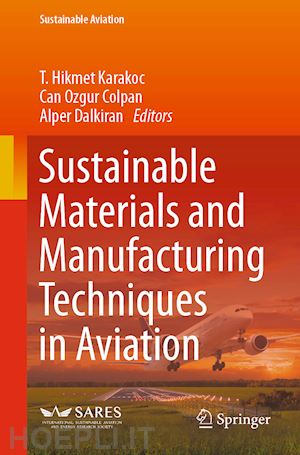
Questo prodotto usufruisce delle SPEDIZIONI GRATIS
selezionando l'opzione Corriere Veloce in fase di ordine.
Pagabile anche con Carta della cultura giovani e del merito, 18App Bonus Cultura e Carta del Docente
This book offers comprehensive coverage of sustainable materials and manufacturing techniques in aviation that reduce fuel consumption, increase operational efficiency, and make more sustainable use of raw materials, energy, and water during manufacturing. Materials that enable the aircraft to be lightweight without compromising safety issues are covered. The sustainability aspects in selecting the materials and manufacturing techniques, as well as performance, cost, and environmental aspects are discussed. Artificial intelligence, machine learning, and digital twins in manufacturing are covered.
Sustainable Materials and Manufacturing Techniques in Aviation will appeal to a broad readership in the aviation community, including students, engineers, scientists, and researchers, as a reference source for material science and modern production techniques.
Selection of Composite Materials for Aircraft.- Biocomposites as Aircraft Materials.- Life Cycle Assessment of the Use of Sustainable Materials in Aviation.- Energy Savings From New Materials and Processes in Aviation.- Green Manufacturing in Aviation.- Additive Manufacturing in Aviation.- Manufacturing Techniques in Electrified Aircraft.- Artificial Intelligence and Machine Learning in the Manufacturing of Aircraft.
T. Hikmet Karakoc, Ph.D., graduated from Anadolu University, the Department of Mechanical Engineering. He received his M.Sc. degree in Mechanical Engineering from the Yildiz Technical University and his Ph.D. from Anadolu University, where he started his full-time teaching and received his Full Professorship. He is a Full Professor with the Faculty of Aeronautics and Astronautics at Eskisehir Technical University and the Information Technology Research and Application Center at Istanbul Ticaret University. Prof. Karakoc has a wide range of research interests, including sustainable aviation, aircraft propulsion systems, insulation, heating, ventilating and air conditioning (HVAC), indoor air quality, gas turbines, cogeneration systems, renewable energy, energy economics, fuels, and combustion. He has participated in numerous industrial projects on these topics as a researcher, consultant, and project manager for over 30 projects and corporations. He served as an Editor-in-Chief, guest editor, and editorial board member for international scientific journals. He published national and international papers in over 300 journals and 40 books. Prof. Karakoc actively follows membership positions for the Chamber of Mechanical Engineers and many sectorial associations, international scientific organizations, and societies. He is an active Board of Directors member of the International Association for Green Energy. He is currently the president of the SARES organization, which actively supports scientists and students in sustainable aviation. He also organizes four symposiums on aviation subject areas as a Founding Chair.
Can Özgür Çolpan, Ph.D., received his bachelor’s and master’s degrees from the Middle East Technical University Mechanical Engineering Department in 2003 and 2005. He conducted his Ph.D. studies at the Department of Mechanical and Aerospace Engineering of Carleton University in Ottawa, Canada, between 2005 and 2009. He continued his studies as a post-doctoral researcher at the same department between 2009 and 2010 and at the Mechanical and Industrial Engineering Department of Ryerson University in Toronto, Canada, between 2010 and 2012. Prof. Çolpan has worked at the Department of Mechanical Engineering of Dokuz Eylül University since 2012. In 2014 and 2019, he was appointed to the positions of Associate Professor and Professor, respectively. He has conducted research in the field of fuel cells and hydrogen and the mathematical modeling of integrated energy systems. He has mainly carried out studies on the following topics: modeling of direct internal reforming solid oxide fuel cells, material development and mathematical modeling for direct methanol fuel cells, development of high-temperature PEM fuel cells, simulation and optimization of the fuel cell vehicle powertrains, catalytic dehydrogenation of solid hydrogen storage materials, analysis of organic Rankine cycle based systems, analysis of biofuel fueled turbojet, mathematical modeling of membrane reactors, mathematical modeling of power-to-gas systems, and development of electrochemical hydrogen compressors. He has worked as conference chairman, technical chair, and organizing committee member in many conferences. He serves as a Board Member of the Turkish Hydrogen Technology Association. In 2019, he won the Turkish Academy of Sciences Outstanding Young Scientist Award (TUBA-GEBIP) and METU Professor Dr. Mustafa N. Parlar Education and Research Foundation’s Research Encouragement Award.
Alper Dalkiran, Ph.D., received his bachelor’s degree Faculty of Aeronautics and Astronautics at Eskisehir Technical University (formerly known as Anadolu University) from the Avionics Department. He completed his MSc degree in the School of Science from Anadolu University in 2004 in Aviation Maintenance. He earned his Ph.D. degree in 2017 in Environmental Sustainability on Airports from the School of Science at Anadolu University by developing a model of energy-based calculations of an aerodrome. Dr. Dalkiran has studied aircraft engines, sustainability, airports, and exergy. He has 17 years of professional experience in airports in information technology, automation, and integration. He has managed teams on system design, projects, tests, commissioning, operational readiness, and operations. He has been working in the School of Aviation at Suleyman Demirel University since 2019 and lecturing in flight theory, airline management, and airport design subjects.











Il sito utilizza cookie ed altri strumenti di tracciamento che raccolgono informazioni dal dispositivo dell’utente. Oltre ai cookie tecnici ed analitici aggregati, strettamente necessari per il funzionamento di questo sito web, previo consenso dell’utente possono essere installati cookie di profilazione e marketing e cookie dei social media. Cliccando su “Accetto tutti i cookie” saranno attivate tutte le categorie di cookie. Per accettare solo deterninate categorie di cookie, cliccare invece su “Impostazioni cookie”. Chiudendo il banner o continuando a navigare saranno installati solo cookie tecnici. Per maggiori dettagli, consultare la Cookie Policy.